|
|
|
Sort Order |
|
|
|
Items / Page
|
|
|
|
|
|
|
| Srl | Item |
| 1 |
ID:
132343
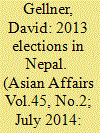

|
|
|
|
|
| Publication |
2014.
|
| Summary/Abstract |
In spite of all the difficulties, the November 2013 elections in Nepal passed off for the most part peacefully and with fewer irregularities than ever before in Nepal. The electoral system was the same as the system used in 2008, with a combination of First Past the Post and Proportional Representation. The results were a defeat for the Maoists, who went from being the biggest single party to the third biggest party. The victors were the two older established parties, the Nepali Congress and the Unified Marxist-Leninists, who seem to have benefitted from the voters dissatisfaction with the Maoists' showing in government. The second big losers in the election were the parties who favoured an ethnic-based solution to Nepal's problems, though the relationship between the Madheshis and the centre remains an unsolved problem.
|
|
|
|
|
|
|
|
|
|
|
|
|
|
|
|
| 2 |
ID:
102748
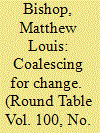

|
|
|
|
|
| Publication |
2011.
|
| Summary/Abstract |
In May 2010 two elections took place in traditional 'Westminster' polities-the United Kingdom and Trinidad and Tobago-in which coalition governments took power. In both countries, a significant part of the discourse in the run-up to election focused on the inequities of the Westminster model, and, in particular, first-past-the-post. Yet, interestingly, the end result in many ways mirrors the kind of outcome often championed by supporters of more proportional electoral systems. This article compares and contrasts the two different elections, and asks whether such coalitions are set to become a regular feature of a more mature Westminster model.
|
|
|
|
|
|
|
|
|
|
|
|
|
|
|
|
| 3 |
ID:
087046
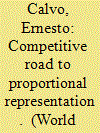

|
|
|
|
|
| Publication |
2009.
|
| Summary/Abstract |
One of the most noteworthy political regularities in the early twentieth century was the shift away from majoritarian electoral rules in Western Europe. The conventional wisdom suggests that proportional representation (pr) was introduced by elites who believed that under the existing majoritarian rules (simple plurality, block-vote, two-ballot rules) they would soon lose power to rapidly growing socialist parties. But this does not explain why many electoral reforms were carried out in countries with weak or nonexistent socialist parties. The author shows that increasing the number of parties distorts the seat-vote properties of electoral rules to a larger degree than previously anticipated. Under increasing party competition, electoral regimes display larger partisan biases than those observed in two-party races and crowd out minority parties that have territorially dispersed constituencies in favor of minority parties that have territorially concentrated constituencies. Using a dynamic Bayesian model for seats and votes, the author measures the partisan biases brought about by the expansion of voting rights in the late nineteenth century to explain the drive to reform majoritarian electoral systems.
|
|
|
|
|
|
|
|
|
|
|
|
|
|
|
|
| 4 |
ID:
153320
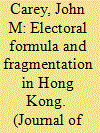

|
|
|
|
|
| Summary/Abstract |
The directly elected representatives to Hong Kong's Legislative Council are chosen by list proportional representation (PR) using the Hare Quota and Largest Remainders (HQLR) formula. This formula rewards political alliances of small to moderate size and discourages broader unions. Hong Kong's political leaders have responded to those incentives by fragmenting their electoral alliances rather than expanding them. The level of list fragmentation observed in Hong Kong is not inherent to PR elections. Alternative PR formulas would generate incentives to form broader, more encompassing alliances. Indeed, most countries that use PR employ such formulas, and the most commonly used PR formula would generate incentives opposite to HQLR's, rewarding broader electoral alliances rather than divisions.
|
|
|
|
|
|
|
|
|
|
|
|
|
|
|
|
| 5 |
ID:
097025
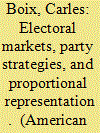

|
|
|
|
|
| Publication |
2010.
|
| Summary/Abstract |
Following Kreuzer's (2010) methodological pleas, I first reflect, at the conceptual level, on the ways in which historical research and political science should be related to each other. I then apply some of those considerations to examine two key "moments" in the theory (and history) of institutional choice that I first presented in Boix (1999): the underlying conditions that shaped the interests of different parties toward proportional representation, and the process through which those interests were translated into actual legislative decisions.
|
|
|
|
|
|
|
|
|
|
|
|
|
|
|
|
| 6 |
ID:
107087
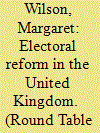

|
|
|
|
|
| Publication |
2011.
|
| Summary/Abstract |
Proposals by the UK Coalition government, which came into power in May 2010, to alter the electoral system for the Westminster Parliament have generated much debate and some controversy. The central plank of the campaigners for reform, viz. the introduction of a form of proportional representation, has been tried in New Zealand for some years now in the form of a mixed member proportional system. This article explains how that system came into being and how it has fared in the nearly two decades for which it has been in existence.
|
|
|
|
|
|
|
|
|
|
|
|
|
|
|
|
| 7 |
ID:
097023
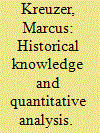

|
|
|
|
|
| Publication |
2010.
|
| Summary/Abstract |
Political scientists commonly draw on history but often do not read actual historians carefully. This limited engagement with historians, and with contextual information more generally, contributes to a loss of historical knowledge that can undermine the validity of quantitative analysis. This article makes this argument by means of an examination of the qualitative evidence underlying the important quantitative arguments about the origins of electoral systems advanced by Carles Boix and by Thomas Cusack, Torben Iversen, and David Soskice. The article explores how their respective attention to historical knowledge affects the quality of their data, the plausibility of their hypotheses, and, ultimately, the robustness of their statistical findings. It also analyzes how such knowledge sheds new light on the causal direction between institutions and their economic effects.
|
|
|
|
|
|
|
|
|
|
|
|
|
|
|
|
| 8 |
ID:
091109
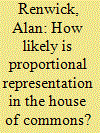

|
|
|
|
|
| Publication |
2009.
|
| Summary/Abstract |
This article asks what international evidence suggests about the likelihood of major reform of the system used to elect the British House of Commons. It identifies four paths that have generated major electoral reform or come close to doing so in established democracies in recent decades and examines how likely each is to lead to reform in the UK. It argues that, on this evidence, reform in the UK is unlikely but not impossible.
|
|
|
|
|
|
|
|
|
|
|
|
|
|
|
|
| 9 |
ID:
072147
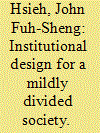

|
|
|
| 10 |
ID:
174012
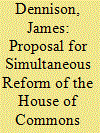

|
|
|
|
|
| Summary/Abstract |
The disproportional electoral system of the House of Commons is increasingly contested, while the undemocratic composition of the House of Lords has been criticised for a century. I first argue that simultaneous reform of both chambers creates the opportunity for far more optimal outcomes than possible under attempts to reform just one chamber. I then argue that bicameralism should continue so that the UK can be represented in two, currently convoluted, ways: as a singular polity in partisan terms and as both an aggregate of constituencies and union of nations, in geographic terms. The former would best take place in a reformed House of Commons, responsible for government formation, and composed of around 300 MPs elected by ‘pure’ proportional representation. The latter would best take place in a reformed House of Lords of around 300 peers, elected by plurality voting from single‐member constituencies. Together, these reforms would improve governance, representation, legitimacy, accountability and the robustness of the union, while retaining celebrated facets of the status quo such as simplicity and the direct constituency link.
|
|
|
|
|
|
|
|
|
|
|
|
|
|
|
|
| 11 |
ID:
178789
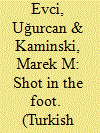

|
|
|
|
|
| Summary/Abstract |
The ruling party in Turkey, the AKP, made an ex post mistake by changing the electoral law before the parliamentary elections in 2018. The new apparentement provision allowed parties to make electoral alliances and the alliances’ total votes could then be used to meet the threshold. Surprisingly, the MHP met the threshold in the election, while one opposition party, the İP, failed to do so. AKP lost the parliamentary majority as a result. We estimate election results using four alternative scenarios, identify all parties that made ex post mistakes in supporting electoral reform, and evaluate the reform’s political consequences.
|
|
|
|
|
|
|
|
|
|
|
|
|
|
|
|
| 12 |
ID:
137795
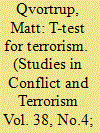

|
|
|
|
|
| Summary/Abstract |
Can electoral reform lead to a reduction in the number of terrorist incidents? Economists have shown that the introduction of constitutional institutions such as courts in the early eighteenth century had a direct effect on investment. Could there be a similar link between the introduction of proportional representation (PR) electoral systems and a reduction in the number of terrorist attacks? Previous studies using cross-sectional data have found a negative correlation between the presence of PR-electoral systems and the number of terrorist incidents. However, earlier studies were based on aggregate figures, not on time-series data. They did not provide a direction that could be used to measure the possible effect of the introduction of PR. This research note addresses this problem. Using a paired samples t-test it is possible to show that the introduction of proportional representation in Northern Ireland and Algeria led to a marked reduction in the number of terrorist attacks. The note thus adds strength to earlier studies.
|
|
|
|
|
|
|
|
|
|
|
|
|
|
|
|
| 13 |
ID:
095297
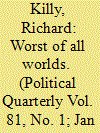

|
|
|
|
|
| Publication |
2010.
|
| Summary/Abstract |
At the 2009 European elections, Britain again elected its MEPs under the 'closed list' system of proportional representation (PR)-the third time it had done so since 1999. This article looks at claims that these elections vindicated PR by producing a 'fairer' relationship between the parties' share of votes and their share of seats, a truer reflection of diverse political allegiance in modern Britain, and (thanks to multi-member constituencies) a more efficient and sensitive system for representing voters. However, the article will also inspect the idea that the case for electoral reform was gravely weakened by the 2009 Euro elections. It will recall how PR again failed to boost turnout, again employed a method of counting that most voters did not understand, and again involved constituencies too large for meaningful representation. Furthermore, it will recall that PR allowed the election of two MEPs from the far-right British National Party. (With just 6% of votes, it is unlikely that the BNP would have secured seats under Britain's traditional electoral system.) The article will argue that, as a result, PR has had a centrifugal effect on the British party system and, potentially, a polarising effect on our political culture. Consequently, the article will assert that, owing to the success of the BNP in 2009, arguments about PR for Westminster have been 'ideologically neutralised'. The article will thus suggest that we can now take a more objective view of hung Parliaments and coalitions (the likely effects of PR at general elections), free from the assumption that they entrench centrist governments and progressive politics.
|
|
|
|
|
|
|
|
|
|
|
|
|
|
|
|
|
|
|
|
|